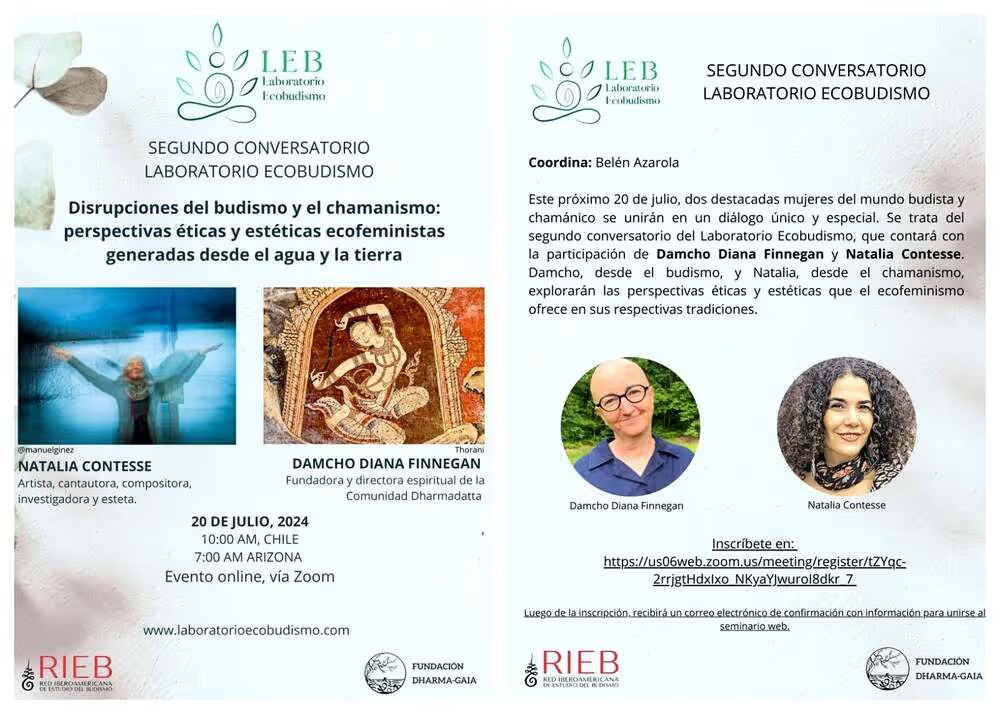
This July 20, two women from the Buddhist and shamanic world will meet in a particularly special dialogue: this is the second Ecobuddhism Lab conversation, this time with Damchö Diana Finnegan and Natalia Contesse. Both, from their own contexts of life, experiences, studies and spiritual lives, will conduct a conversation around ecofeminism and its disruptions. Both in Buddhism, in Damchö's case, and in shamanism, as Natalia observes, they will talk about what ethical and aesthetic perspectives are possible to interpret, live and experience from ecofeminism in both traditions, taking water and earth as elements of nature.
Damchö is a lay Buddhist teacher, who has been on the Buddhist path for more than 25 years and is co-founder of the Dharmadatta community of Buddhist nuns, the Buddhadharma Institute and the Albricias publishing house. All are instances for learning and dissemination of the Dharma, as well as attention to the role of women in Buddhism, its current conditions and the vision of women in Buddhist practice from a gender perspective. Damchö is a tireless teacher, she has been teaching Buddhism for years and has taken her retreats to various countries, with special attention to Latin America. Damchö takes ecofeminism as a current of thought and a social movement, which can learn from Buddhism and vice versa, and it is on the latter that she will focus her talk with LEB, taking the earth as an element.
Natalia Contesse is an artist, singer-songwriter, composer, aesthete and researcher of popular and traditional Chilean and American culture, who has based her artistic and spiritual learning on folk music and shamanism. Under the teachings of Carmen Vicente, shaman, master in the healing craft and artist, Natalia has forged a shamanic path for more than 20 years of her life, combining art with feminine ritual, reading the cycle of nature from the construction of altars, honoring its elements and the ethical and aesthetic value of beauty. Natalia, from the teachings of shamanism, conceives water as a living aesthetic being. From this consideration, she will establish dialogues with the role of the feminine and the ecosystemic value under this element of nature.
We invite you to be part of this wonderful meeting of Damchö and Natalia, to meet and meet again from two different traditions, which are united by and in the land and water!
The Ecobuddhism Laboratory (LEB) emerges as an executing, collaborative, creative and participatory network, which allows to analyze new interpretations and ideas with Buddhist bases, and to interact with diverse cultural, scientific, academic, educational entities, etc., that enrich the dialogue and the execution of ecological projects and programs in the sanghas. Our intention is to create an interdisciplinary laboratory to showcase ecological actions in the sanghas, as well as to expand the theoretical and experiential interaction between Buddhism and ecology in the multiplicity of areas in which ecological awareness develops, in a way that is both theoretically and practically supportive of environmental sustainability.
REGISTER AT:
https://us06web.zoom.us/meeting/register/tZYvcO2tqzgqG9GnFDyJKZcLQGjbRpdrtt5l
LINKS:
Ecobudismo Laboratory
https://www.laboratorioecobudismo.com/
https://www.instagram.com/laboratorioecobudismo/
https://www.youtube.com/channel/UCt5eGdL3CYee0xaql0RaqRQ
Dharma-Gaia Foundation
https://www.fundaciondharmagaia.com/
Buddhistdoor in English
Special issue: "Buddhism, ecology and climate change".
Global Systemic Crisis and Buddhism: Towards a Paradigm Shift by Jordi Solé Ollé










